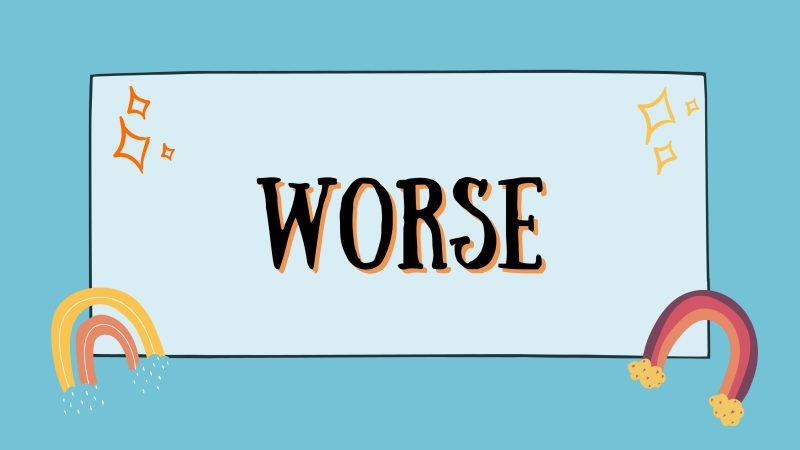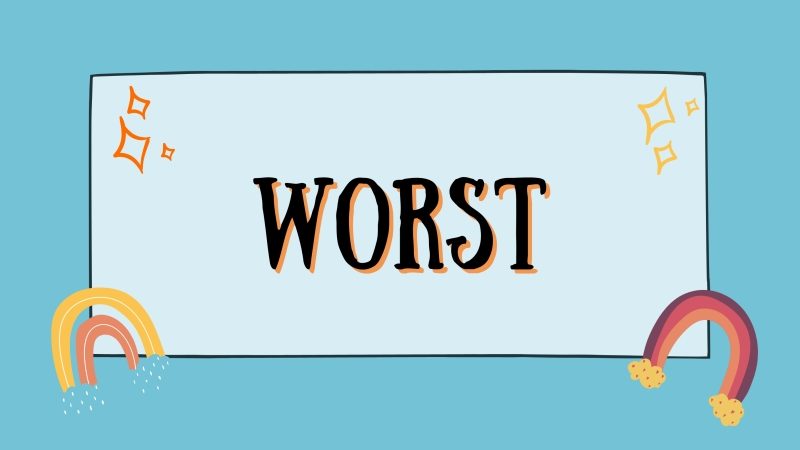Do you know the difference between these two words? What's the worst that can happen if you don’t?
Let's kick this off by saying these two words are adjectives. As such, they intend to give nouns or pronouns a characteristic, a personification, a way for nouns or pronouns to express themselves in the language.
In general, adjectives are used as modifying words but they are also the way we can give a hierarchy to nouns (or pronouns) and compare them.
To explain the basics about adjectives let’s imagine you are about to start a trip to Hawaii. In the beginning, you feel fine inside the plane and think to yourself: “This is a good plan” Same as you, the adjective ‘good’ is on a positive stage (basic form). It only needs to be itself!
As time passes, the plane takes off and reaches a stormy sky. You start to get nervous and consider that: “Maybe going by train to somewhere else would have been a better plan”. Now the adjective is worried like you and starts to compare to other ‘better’ options (comparative stage).
The storm goes away and in no time you land and see the sea. You reach the highest point of emotion, there is nothing like it! So you say: “This is the best plan ever!” and the adjective is at its ‘best ‘ along with you (superlative stage). It is at the highest place of its kind. Luckily this time, everything went well for you and our friend in its different faces!
But this story is about their opposites!
Just as ‘better' and ‘best' are different forms of the adjective ‘good', ‘worse' and ‘worst' are different ways of expressing how bad something is. Do you want to know when and how to use them? Here's everything you need to know!
Worse

‘Worse’ is the comparative form of ‘bad’ and ‘ill’ adjectives and ‘badly’ and ‘ill’ adverbs. Is it bad to know about it? Definitely not!
The comparative form is used when you try to compare two items or people. It refers to whether any of these elements has the characteristic of the adjective to a greater extent. For regular adjectives, the comparative form can be constituted in two ways:
Adding the -er ending to the adjective – “My hair is longer than yours.”
Adding the word ‘more’ before the adjective – “She is more beautiful than me.”
As you have seen above, to compare two things we must write the word ‘than’ between the adjective and the second element of the comparison.
You may wonder why ‘worse’ does not end in -er. This is because bad is not a regular adjective, meaning it is an exception but that does not mean it won’t comply with the rules and definition we’ve mentioned above!
‘Worse’ means ”of poorer quality or lower standard” As in the previous examples, you can use worse to compare two things. To make this comparison you can use the word ‘than’ after the word ‘worse’:
“This road is worse than the first one we took”
In some cases ‘than’ could be omitted, but we would still be making a comparison, even if it is not in the sentence.
For example, if you say “the weather is getting worse,” you are making a comparison to what the weather was like at another time, even if you are not saying it.
Besides being the comparative form of an adjective, ‘worse’ is also a comparative adverb and a noun. Worse is the comparative adverb of ‘ill’. While adjectives modify nouns, adverbs modify any other part of speech. In this case, for example, it modifies an action:
“She performed poorly on the test, but I performed worse”
Whether as an adjective, comparative adverb, or noun, worse has the same meaning: it is something that lacks quality, is poorly made, or feels bad. In case you need it, here is an example of the use of worse as a noun:
“They vowed to stay together for better or for worse”
If we were about to discuss the scale of evilness, ‘worse’ is above ‘bad’, since it is used to express the poorest thing between two things that are already bad. However, ‘worst’ takes the top prize as it is the superlative of the adjective bad. Let’s see what this means!
Worst

As said, ‘worst’ is the superlative form of ‘bad’ and ‘ill’. But, what is this?
The superlative form is used when you try to compare multiple items or people. It refers to the ”poorest quality or lowest standard”, the most awful extent of an adjective, meaning the highest degree of the base adjective.
For regular adjectives, the superlative form can be built in two ways:
Adding the -est ending to the adjective or adding the word ‘most’ before the adjective. But ‘worst’ belongs to the irregular adjectives!
Now, using examples of ‘worst’ to explain it:
“The driver said it was the worst earthquake he ever felt.”
That is, the earthquake was at the top of the Richter scale.
“Mickaela was prepared for the worst ending in the movie, but a plot twist happened!”
Same as worse, worst can be used as a noun and as an adverb. Additionally, it can be used as a verb! Let’s see some examples:
As a noun: “After going into the Amazonian wilderness, the explorer asked, ‘What’s the worst thing that could happen to us?’”
She was wondering what would be the most dangerous thing above all.
As an adverb: “The US has been among the countries worst hit (highly affected) by the coronavirus.”
As a verb “Swedish man was worsted (defeated) by the Norwegian fighter.”
A quick tip for you: Now and then, the words badder and baddest are used as the comparative and superlative forms of bad. They are used as slang.
Wrapping up
Worse and worst are irregular adjectives. Worse is the comparative form while worst is the superlative form of bad (positive form). In addition, both can be used as adjectives, adverbs, or nouns to express the badder or the baddest of any given event or situation. Worst can be also used as a verb while worse can’t! To help you remember, worse is the mild, and worst is the severe phase of a bad thing.
Let’s get better, not worse with these words and be the best, not the worst you can be every day!